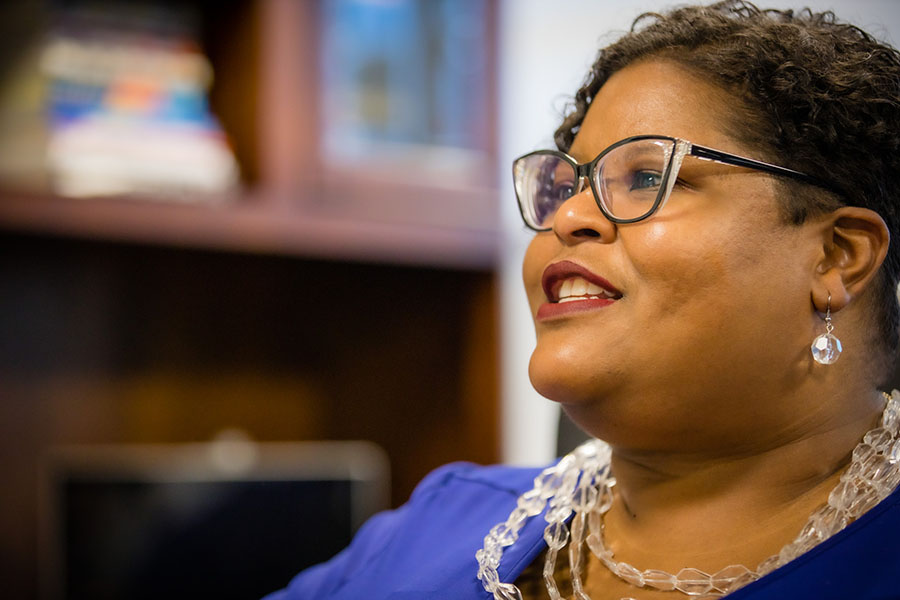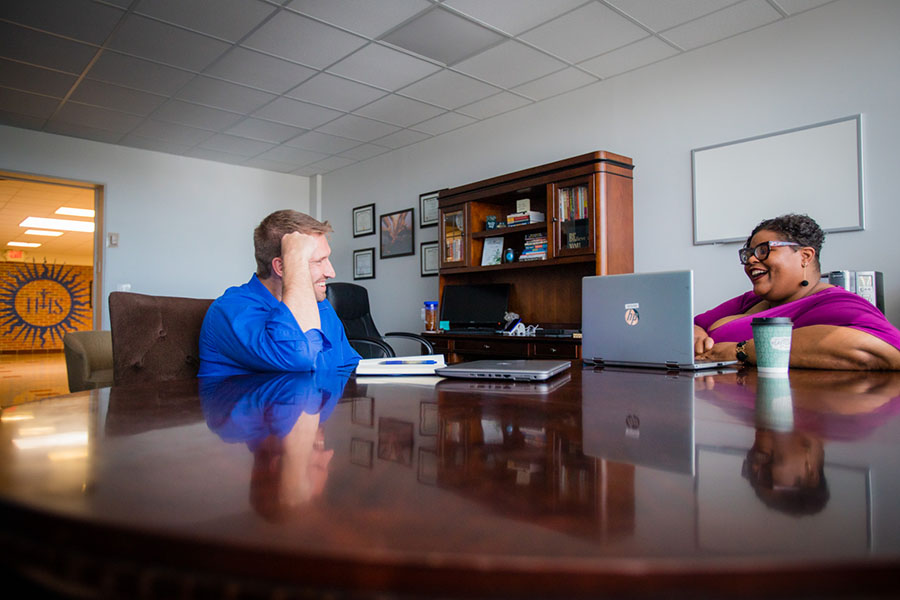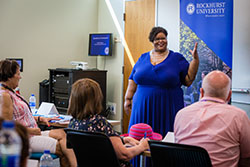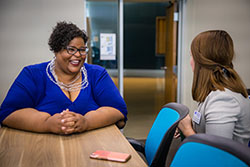
Dr. Leslie Doyle returned last spring to Rockhurst University in Kansas City, Missouri, to become its inaugural chief inclusion officer in its newly created Office of Diversity, Equity and Inclusion (DEI). (Photos by Todd Weddle/Northwest Missouri State University)
Sept. 30, 2019
As a child, Dr. Leslie Doyle ’97 saw opportunity as she ran and played with her brother on the lush lawns of the Rockhurst University campus across the street from her home at 5340 Troost Ave. in Kansas City, Missouri.
“It was safe,” Doyle said. “To be a kid growing up on Troost, you wanted a place that felt like a park. It was green and there were wide open spaces. You didn’t have to worry about cars, and you could ride your bike and have a good time without any trouble.”
A lot has changed in the neighborhood, and socially, since Doyle’s family moved from the neighborhood 34 years ago. The Troost Avenue property where she lived her elementary school years is a grassy field now. The Rockhurst campus’ footprint is bigger with newer facilities, and buildings that stood during her childhood look much different inside. The structure that houses Rockhurst’s public safety department today used to be the neighborhood grocery store.
Doyle’s connection to the community and a vision to help it become more inclusive drew her back to Rockhurst last spring when the university made her its inaugural chief inclusion officer in its newly created Office of Diversity, Equity and Inclusion (DEI). Doyle transitioned to Rockhurst in April from Fontbonne University in St. Louis, where she had worked since 2005 and became its director of service, diversity and social justice in 2008.
“Diversity, equity and inclusion matters as our world becomes more diverse, and it is imperative for us to harness the power of diversity to reach our highest potential. Diversity, equity and inclusion is an important business strategy, a moral imperative, and it’s our humanity. We are inexplicably connected to one another, so what happens to one of us, happens to all of us, and higher education is responsible for training leaders. We must prepare them to be citizens in a global economy.
”
The daughter of postal workers, a product of the Kansas City public school system and a devout Christian, Doyle’s range of experiences inform her perception of diversity and inclusion. Although her connection to Rockhurst is rooted in her childhood memories, Northwest is where she began to realize the ways she could be a guiding presence to others like her.
“Hindsight being what it is, now I understand God intended me to be there all along,” she said. “I found a home in mass communication, but I really found my passion for working with students at Northwest.”
Doyle admired the African American broadcasters appearing on Kansas City news stations at that time and wanted to study broadcasting at a St. Louis university. With a nudge from her aunt, Karen Daniel ’80, and cousin, Angela Guess Hammons ’85, she enrolled at Northwest and completed a bachelor’s degree in mass communication and broadcast journalism.
“I aspired to be Oprah, and I laugh at that now,” Doyle said. “I think there was a class near my senior year where I had that crisis that students have. I’m thinking, ‘I don’t know if this is for me.’ But at the time it seemed like a beautiful aspiration.”
At Northwest, Doyle had worked as a resident assistant for two years in Hudson, Perrin and Roberta halls and then as a desk assistant in Hudson Hall during her senior year. That work kindled her interest in higher education and student services.
“She was a fierce advocate from day one,” Wendy Steinberg, who supervised Doyle as the Hudson hall director and now works as an academic advisor at Cincinnati State Technical and Community College, said. “We were a staff of 12 women, and sometimes we were not as inclusive or appropriate as a staff as you would hope. Leslie, in her kind and generous manner, would bring a teachable moment to our staff meetings, and we only walked away stronger as a team and more educated individually.”
With encouragement from Steinberg and Pat Foster, who was then the director of multicultural affairs at Northwest, Doyle educated herself about careers in higher ed and began to view university employees with fresh eyes.
“It really opened some paths for me that I hadn’t considered, but I’m so happy that it did,” Doyle said. “I have been studying higher education for the last 22 years. It caused me to think about the impact that I could have in higher education for people who look like me and also how I could have an influence on systems and structures to make higher education more equitable.”
She landed a job as a hall director at the University of Kansas after graduating from Northwest. As she earned a master’s degree in higher education at KU, her experiences inside a highly diverse residence hall where she still felt marginalized further instilled her interest in diversity and inclusion work.
She embraced a challenge to be a change agent and solidified her path.
“It was amazing to know that you could build relationships with students and get to know them and be of assistance along their path,” she said. “It was something that really helped me crystallize that idea that I could work in higher education.”

Leslie Doyle meets with Kirk Skoglund ’12, the director of the Learning Center at Rockhurst University, to discuss initiatives for the upcoming academic year. As she settles into her new role at Rockhurst,

Leslie Doyle speaks to a group of high school counselors about diversity, equity and inclusion efforts at Rockhurst University.

Doyle has been eager to learn and listen to others’ perspectives while seeking ways to connect with the community.
After a stint at University of Missouri-Kansas City, Doyle spent six years at Nebraska Wesleyan University in Lincoln, Nebraska, where her role focused on the student experience. At Fontbonne, she took on more responsibilities and developed as a leader in thinking not just about student services but faculty and staff, too, and educating them about diversity and inclusion issues. She earned a second master’s degree in business and leadership at Fontbonne and completed her Doctor of Education in higher education leadership at Maryville University in St. Louis.
But it was the 2014 shooting death of Michael Brown, an unarmed black teenager, by a white Ferguson, Missouri, police officer that may have had the biggest impact on Doyle and her work as a higher education leader. Doyle saw firsthand the protests that engulfed the St. Louis suburb after the incident and how its effects rippled across the higher education sector and the country.
Doyle’s personal vision of diversity, equity and inclusion evolved from focusing on the student experience to focusing on systems and structures that limit inclusion and guiding university communities to act as conduits for change in the larger communities they support. She believes education is a critical pathway to helping people of all identities reach their full potential.
“I think students are calling for more accountability on the part of higher education institutions to meet their needs,” Doyle said. “Institutions have a responsibility to be responsive to students and to support students’ learning, growth and development, and diversity is an important part of that. Creating inclusive communities helps us to create a better learning environment for students, and that’s what we’re hoping to do.”
Like Doyle, colleges and universities throughout the country are altering the ways they approach diversity, equity and inclusion amid shifting demographics and continued calls for change. According to the Pew Research Center, America is more racially and ethnically diverse than ever, and no single race or ethnicity will have a majority in the U.S. by 2055. Rockhurst, with an enrollment of about 3,000 students, hired Doyle after a campus climate survey and evaluation process with faculty, staff and students that lasted for more than a year.
“Inevitably, we will become more diverse. That’s just the way it is, and we can choose to embrace that or we can choose to fight against it. My ideas are to embrace it and harness the power of diversity to make us better.
”
Doyle’s charge at Rockhurst is to work collaboratively with students, faculty and staff to develop offerings for the campus community that facilitate growth in self-awareness and the understanding of others.
With the university uniquely positioned on the so-called Troost divide – a perceived boundary separating poor and black families from those who are wealthy and white – Doyle hopes to establish the institution as a regional leader in diversity, equity and inclusion but knows it will take the entire Rockhurst community for that to become a reality. She explains her excitement about the possibilities by taking the words of diversity advocate Verna Myers – “Diversity is being invited to the party. Inclusion is being asked to dance.” – a step further.
“We want to celebrate diversity,” Doyle said. “We not only invite you to the party, we not only ask you to dance, but we play your favorite songs to pump you up. That’s how life should be. That’s how diversity should be, where people can be themselves, be celebrated and reach their full potential. Unfortunately, this is the work of a lifetime and I’m going to try my best to engage in that work, to deputize people to join me and work alongside others.”